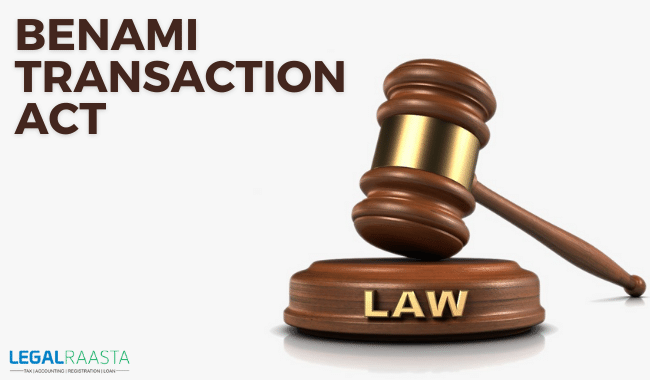Benami Transaction (Prohibition) Act,1988
The Benami Transaction (Prohibition) Act of 1988 was enacted to prevent and regulate Benami transactions, as well as the power to reclaim Benami property and any other transaction related to them. The widespread transactions in Benami property in the country with the goal of tax evasion on the grounds that the real owner is barred from enforcing his right, interest, claim, or action in the impugned property in court unless he produced documents mentioning income of that property for lack of income tax or had given prior notice of claim to concerned income tax authorities.
As provided in Section 4 of the Act, the Act imposes restrictions on the right of recovery of the property held Benami under the Act by way of enforcing or defending such right, claim, or interest against the person in whose name the property is held or any other person claiming to be the real owner of the property. As a result, this part plays a critical role in conducting Benami transactions involving Benami-owned property.
Legislative background
The Benami Transactions (Prohibition) Act of 1988 established the first law governing Benami transactions. There were just eight sections to this Act. The Benami Transactions (Prohibition) Amendment Act, 2016, which included 72 sections, later changed the law.
What exactly is the Benami property?
A Benami property according to section 2 (c) of the act is any property that has been the subject of a Benami transaction, whether it be mobile or immovable, tangible or intangible. This would also include the money received from the sale of the property. The right or any other document indicating ownership or interest in such property would likewise be considered Benami property.
The Persian term “Benami” implies “analogous” or “without a name.” Persons vested with no advantage other than the transfer and legally recorded name in the property are referred to as benamidars in such transactions. The beneficiary owner is the person who pays attention to a Benami property that is fit of interest now or in the future, such as tax fraud, avoiding payment to creditors, or using black money. The following transactions can be classified as Benami transactions:
- Property acquired through Benami transactions is held under a false identity.
- The true owner of the property has no awareness of its ownership or denies having any knowledge of its ownership.
- When the individual supplying the consideration is untraceable or false, such as when the name of the beneficiary owner is unknown.
Instances of Benami transactions
- Every state has a cap on how much agricultural land an individual or family can own. As a result, when such a limit is reached, people attempt to purchase property in the name of another person while providing the necessary consideration.
- A person who has access to price-sensitive information of a company as a result of holding a position of power within the firm is not permitted to trade in the company’s shares because this would be considered insider trading. To get out of this, they enlist the help of a third party and offer him the monies to trade on their behalf.
- Many people were caught depositing old notes into their bank accounts that belonged to someone else and then swapping them for new notes during demonetization. The Benami act’s definition of property is fairly broad, and it includes cash. As a result, such a transaction is also known as a Benami transaction.
The Benami Transaction’s Exceptions
Benami transactions do not include the following transactions, as defined by Sections 4(3) and 3(2) of the Act:
- Property owned by a HUF member or coparcener for the benefit of other coparceners in the family, for which payment is made from known sources of income.
- A person holding the property is a trustee or another person for the benefit of all persons for whom he is the trustee as accountable for standing in his position
- Unless it can be demonstrated that the property was purchased for the advantage of the spouse or unmarried daughter, it is retained in the name of the spouse or unmarried daughter and the consideration is paid from known sources of income.
Penalty
The penalty under the Act is punishable by imprisonment for up to three years, a fine, or both, as specified in Section 3(3) of the Act. It also includes the confiscation and acquisition of all properties related to benami transactions by such authority in accordance with any applicable rules and regulations. Non-cognizance and bailable offenses are penalized by the prohibition of Benami transactions.
Implications of the Income Tax Act,1961
Benami transactions were discovered to be a system to defraud and escape tax by partaking in such illicit agreements and thereby diverging from genuine and legal transactions during the implementation of the Income Tax Act of 1961.
To give effect to such transactions, Parliament passed Section 281A of the Income Tax Act, which states: ‘Effect of failure to furnish information in respect of property held Benami,’ in the sense that property held Benami can be challenged in any suit before any court of law to enforce any right, whether against the name of the person whose name the property is registered or any other person claiming to be the real owner unless the claimant has given notice containing particulars. Parliament created the Benami Transaction (Prohibition) Act, 1988, because section 281A of the IT Act had no effect on such an effect of prohibition.
Conclusion
Article 19(g) guarantees every party the right to enter into an agreement for the sale or purchase of mobile or immovable, tangible, or intangible property, as well as the right to trade and carry on any business within reasonable limits. Any illegal transaction that is unnamed or named under another person and has no flow of consideration but otherwise holds the property for the benefit of another person is illegal because it violates the principle that property must be transferred in the person’s favor for whom the transaction was executed.
The Act authorizes the Central Government to make rules for the purpose of authorizing authority to acquire property held benami, as well as the mode and procedure for doing so while the property is being acquired. This Act was revised in 2016 to offer a complete regulatory framework for authority, transactions, and other pertinent things in order to create a robust legal framework for Benami transactions.
The increase of Benami transactions during the Act’s existence and enforcement shows that rigorous regulation and widespread awareness of the Act’s ban of Benami transactions are urgently needed. Imposing strong penalties on those who engage in Benami transactions in order to reduce what tends to stifle the country’s economic development at the expense of those who engage in lawful and valid transactions. Because the person holding Benami property in legal terms and conditions assumed the right of another person to hold that property.
Related posts
Indian Trusts Act – Objectives, Registration of trust, Formation & Taxation
Section 24 of Indian Income Tax Act – Income tax deductions from house property










